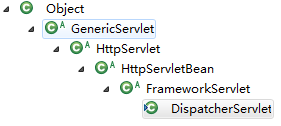SpringMVC源代码学习(一)从HTttpServletBean到DispatcherServlet
以下内容基于书:《看透SpringMVC-源代码分析与实践》
基本照搬。。。用于自己查阅备忘。
观察DispatcherServlet继承树

做java web的应该都知道GenericServlet到HttpServlet的关系,它们都是 javax.servlet;包下的。
从HttpServletBean开始就是由Spring定义的了。
我们知道HttpServlet有一个无参的init()方法交由子类实现,用于类的初始化,那我们从HTttpServletBean中的init()方法开始分析。
@Override
public final void init() throws ServletException {
//log ...
// Set bean properties from init parameters.
try {
PropertyValues pvs = new ServletConfigPropertyValues(getServletConfig(), this.requiredProperties);
BeanWrapper bw = PropertyAccessorFactory.forBeanPropertyAccess(this);
ResourceLoader resourceLoader = new ServletContextResourceLoader(getServletContext());
bw.registerCustomEditor(Resource.class, new ResourceEditor(resourceLoader, getEnvironment()));
initBeanWrapper(bw);
bw.setPropertyValues(pvs, true);
}
//catch Exception ...
// Let subclasses do whatever initialization they like.
initServletBean();
//log ...
}
首先将Servlet中配置的参数使用BeanWrapper设置到DispatcherServlet的相关属性,然后调用模版方法initServletBean,
子类,也就是FrameworkServlet通过定义自己的initServletBean定义了自己的初始化内容。
FrameworkServlet的initServletBean
@Override
protected final void initServletBean() throws ServletException {
//log ...
long startTime = System.currentTimeMillis();
try {
this.webApplicationContext = initWebApplicationContext();
initFrameworkServlet();
}
//catch ...
//log ...
}
过滤掉日志与catch代码,主要代码有两句,分别说一下:
1、FrameworkServlet的initFrameworkServlet方法。
类似于HTttpServletBean的initServletBean,这个方法没有内容,是供给子类调用的模版方法。
2、initWebApplicationContext方法,详细代码如下:
protected WebApplicationContext initWebApplicationContext() {
WebApplicationContext rootContext =
WebApplicationContextUtils.getWebApplicationContext(getServletContext());
WebApplicationContext wac = null;
if (this.webApplicationContext != null) {
// A context instance was injected at construction time -> use it
wac = this.webApplicationContext;
if (wac instanceof ConfigurableWebApplicationContext) {
ConfigurableWebApplicationContext cwac = (ConfigurableWebApplicationContext) wac;
if (!cwac.isActive()) {
// The context has not yet been refreshed -> provide services such as
// setting the parent context, setting the application context id, etc
if (cwac.getParent() == null) {
// The context instance was injected without an explicit parent -> set
// the root application context (if any; may be null) as the parent
cwac.setParent(rootContext);
}
configureAndRefreshWebApplicationContext(cwac);
}
}
}
if (wac == null) {
// No context instance was injected at construction time -> see if one
// has been registered in the servlet context. If one exists, it is assumed
// that the parent context (if any) has already been set and that the
// user has performed any initialization such as setting the context id
wac = findWebApplicationContext();
}
if (wac == null) {
// No context instance is defined for this servlet -> create a local one
wac = createWebApplicationContext(rootContext);
}
if (!this.refreshEventReceived) {
// Either the context is not a ConfigurableApplicationContext with refresh
// support or the context injected at construction time had already been
// refreshed -> trigger initial onRefresh manually here.
onRefresh(wac);
}
if (this.publishContext) {
// Publish the context as a servlet context attribute.
String attrName = getServletContextAttributeName();
getServletContext().setAttribute(attrName, wac);
if (this.logger.isDebugEnabled()) {
this.logger.debug("Published WebApplicationContext of servlet '" + getServletName() +
"' as ServletContext attribute with name [" + attrName + "]");
}
}
return wac;
}
其中有三步,1、第一步,判断是不是在构造方法中传递webApplicationContext参数,ServletContext.addServlet方式注册Servlet
2、第二步,判断是不是通过web.xml配置文件传入webApplicationContext参数
3、第三步,在前面两部探索后都没有找到webApplicationContext的情况下自己创建一个。
这个过程由createWebApplicationContext方法来做,它内部又调用了configureAndRefreshWebApplicationContext方法完成,createWebApplicationContext代码如下:
protected WebApplicationContext createWebApplicationContext(ApplicationContext parent) {
Class<?> contextClass = getContextClass();
if (this.logger.isDebugEnabled()) {
this.logger.debug("Servlet with name '" + getServletName() +
"' will try to create custom WebApplicationContext context of class '" +
contextClass.getName() + "'" + ", using parent context [" + parent + "]");
}
if (!ConfigurableWebApplicationContext.class.isAssignableFrom(contextClass)) {
throw new ApplicationContextException(
"Fatal initialization error in servlet with name '" + getServletName() +
"': custom WebApplicationContext class [" + contextClass.getName() +
"] is not of type ConfigurableWebApplicationContext");
}
ConfigurableWebApplicationContext wac =
(ConfigurableWebApplicationContext) BeanUtils.instantiateClass(contextClass);
wac.setEnvironment(getEnvironment());
wac.setParent(parent);
wac.setConfigLocation(getContextConfigLocation());
configureAndRefreshWebApplicationContext(wac);
return wac;
}
在其中我们看到的contextConfigLocation就是spring的配置文件地址,默认是WEB-INFO/[ServletName]-Servlet.xml。
再看一下configureAndRefreshWebApplicationContext的代码:
protected void configureAndRefreshWebApplicationContext(ConfigurableWebApplicationContext wac) {
if (ObjectUtils.identityToString(wac).equals(wac.getId())) {
// The application context id is still set to its original default value
// -> assign a more useful id based on available information
if (this.contextId != null) {
wac.setId(this.contextId);
}
else {
// Generate default id...
wac.setId(ConfigurableWebApplicationContext.APPLICATION_CONTEXT_ID_PREFIX +
ObjectUtils.getDisplayString(getServletContext().getContextPath()) + "/" + getServletName());
}
}
wac.setServletContext(getServletContext());
wac.setServletConfig(getServletConfig());
wac.setNamespace(getNamespace());
wac.addApplicationListener(new SourceFilteringListener(wac, new ContextRefreshListener()));
// The wac environment's #initPropertySources will be called in any case when the context
// is refreshed; do it eagerly here to ensure servlet property sources are in place for
// use in any post-processing or initialization that occurs below prior to #refresh
ConfigurableEnvironment env = wac.getEnvironment();
if (env instanceof ConfigurableWebEnvironment) {
((ConfigurableWebEnvironment) env).initPropertySources(getServletContext(), getServletConfig());
}
postProcessWebApplicationContext(wac);
applyInitializers(wac);
wac.refresh();
}
有一句要注意一下:
wac.addApplicationListener(new SourceFilteringListener(wac, new ContextRefreshListener()));
ContextRefreshListener是FrameworkServlet的内部类,监听ContextRefreshedEvent事件,当接收到消息时调用FrameworkServlet的onApplicationEvent方法,在onApplicationEvent中会调用一次onRefresh方法,将refreshEventReceived标志设置为true,表示refresh过。
private class ContextRefreshListener implements ApplicationListener<ContextRefreshedEvent> {
@Override
public void onApplicationEvent(ContextRefreshedEvent event) {
FrameworkServlet.this.onApplicationEvent(event);
}
}
public void onApplicationEvent(ContextRefreshedEvent event) {
this.refreshEventReceived = true;
onRefresh(event.getApplicationContext());
}
注意看之前的initWebApplicationContext方法,方法较后的位置会判断根据refreshEventReceived标志来判断是否要运行onRefresh,
第一种方法已经调用了configureAndRefreshWebApplicationContext,就是已经refresh过了,第三种方法也是,所以只有第二种需要重新运行它。
DispatcherServlet就是通过重写onRefresh模版方法实现初始化的。
下面我们看DispatcherServlet中重写的onRefresh方法代码,如下:
@Override
protected void onRefresh(ApplicationContext context) {
initStrategies(context);
}
再看initStrategies
protected void initStrategies(ApplicationContext context) {
initMultipartResolver(context);
initLocaleResolver(context);
initThemeResolver(context);
initHandlerMappings(context);
initHandlerAdapters(context);
initHandlerExceptionResolvers(context);
initRequestToViewNameTranslator(context);
initViewResolvers(context);
initFlashMapManager(context);
}
任意取一个,如initLocaleResolver,其他8种也是类似的。
private void initLocaleResolver(ApplicationContext context) {
try {
this.localeResolver = context.getBean(LOCALE_RESOLVER_BEAN_NAME, LocaleResolver.class);
if (logger.isDebugEnabled()) {
logger.debug("Using LocaleResolver [" + this.localeResolver + "]");
}
}
catch (NoSuchBeanDefinitionException ex) {
// We need to use the default.
this.localeResolver = getDefaultStrategy(context, LocaleResolver.class);
if (logger.isDebugEnabled()) {
logger.debug("Unable to locate LocaleResolver with name '" + LOCALE_RESOLVER_BEAN_NAME +
"': using default [" + this.localeResolver + "]");
}
}
}
我们可以看到它调用了getDefaultStrategy方法,getDefaultStrategy又调用了getDefaultStrategies方法,两个一起列出来
protected <T> T getDefaultStrategy(ApplicationContext context, Class<T> strategyInterface) {
List<T> strategies = getDefaultStrategies(context, strategyInterface);
if (strategies.size() != 1) {
throw new BeanInitializationException(
"DispatcherServlet needs exactly 1 strategy for interface [" + strategyInterface.getName() + "]");
}
return strategies.get(0);
}
protected <T> List<T> getDefaultStrategies(ApplicationContext context, Class<T> strategyInterface) {
String key = strategyInterface.getName();
String value = defaultStrategies.getProperty(key);
if (value != null) {
String[] classNames = StringUtils.commaDelimitedListToStringArray(value);
List<T> strategies = new ArrayList<T>(classNames.length);
for (String className : classNames) {
try {
Class<?> clazz = ClassUtils.forName(className, DispatcherServlet.class.getClassLoader());
Object strategy = createDefaultStrategy(context, clazz);
strategies.add((T) strategy);
}
catch (ClassNotFoundException ex) {
throw new BeanInitializationException(
"Could not find DispatcherServlet's default strategy class [" + className +
"] for interface [" + key + "]", ex);
}
catch (LinkageError err) {
throw new BeanInitializationException(
"Error loading DispatcherServlet's default strategy class [" + className +
"] for interface [" + key + "]: problem with class file or dependent class", err);
}
}
return strategies;
}
else {
return new LinkedList<T>();
}
分析getDefaultStragedies,可以发现,数据转换的关键在于传入key,根据defaultStrategies.getProperty(key); 得到value,在ide里可以看出来defaultStrategies是一个静态变量,类型是properties,它通过一个静态块进行初始化,代码如下:
private static final String DEFAULT_STRATEGIES_PATH = "DispatcherServlet.properties";
private static final Properties defaultStrategies;
static {
// Load default strategy implementations from properties file.
// This is currently strictly internal and not meant to be customized
// by application developers.
try {
ClassPathResource resource = new ClassPathResource(DEFAULT_STRATEGIES_PATH, DispatcherServlet.class);
defaultStrategies = PropertiesLoaderUtils.loadProperties(resource);
}
catch (IOException ex) {
throw new IllegalStateException("Could not load 'DispatcherServlet.properties': " + ex.getMessage());
}
}
这里可以看出来这个变量通过读取DEFAULT_STRATEGIES_PATH路径下property文件来进行值得初始化,DEFAULT_STRATEGIES_PATH得代码我也顺便加在上面了,它在spring-beans-4.2.5.RELEASE-sources.jar里,位置就在org.springframework.web.servlet.DispatcherServlet.properties,内容如下:
# Default implementation classes for DispatcherServlet's strategy interfaces.
# Used as fallback when no matching beans are found in the DispatcherServlet context.
# Not meant to be customized by application developers.
org.springframework.web.servlet.LocaleResolver=org.springframework.web.servlet.i18n.AcceptHeaderLocaleResolver
org.springframework.web.servlet.ThemeResolver=org.springframework.web.servlet.theme.FixedThemeResolver
org.springframework.web.servlet.HandlerMapping=org.springframework.web.servlet.handler.BeanNameUrlHandlerMapping,\
org.springframework.web.servlet.mvc.annotation.DefaultAnnotationHandlerMapping
org.springframework.web.servlet.HandlerAdapter=org.springframework.web.servlet.mvc.HttpRequestHandlerAdapter,\
org.springframework.web.servlet.mvc.SimpleControllerHandlerAdapter,\
org.springframework.web.servlet.mvc.annotation.AnnotationMethodHandlerAdapter
org.springframework.web.servlet.HandlerExceptionResolver=org.springframework.web.servlet.mvc.annotation.AnnotationMethodHandlerExceptionResolver,\
org.springframework.web.servlet.mvc.annotation.ResponseStatusExceptionResolver,\
org.springframework.web.servlet.mvc.support.DefaultHandlerExceptionResolver
org.springframework.web.servlet.RequestToViewNameTranslator=org.springframework.web.servlet.view.DefaultRequestToViewNameTranslator
org.springframework.web.servlet.ViewResolver=org.springframework.web.servlet.view.InternalResourceViewResolver
org.springframework.web.servlet.FlashMapManager=org.springframework.web.servlet.support.SessionFlashMapManager
默认配置在相应类型没有配置时才会使用,如当使用< mvc:annotation-driven />后,并不会全部使用默认配置,因为它配置了HandlerMapping\HandlerAdapter和Handler-ExceptionResolver。
那总的来说,
HttpServletBean直接继承自java的HttpServlet,作用是将Servlet中配置的参数设置到相应的属性;FrameworkServlet初始化了WebApplicationContext,DispatcherServlet初始化了自身的9个组件。
FrameworkServlet初始化WebApplicationContext一共有三种方式,过程中使用了Servlet中配置的一些参数。